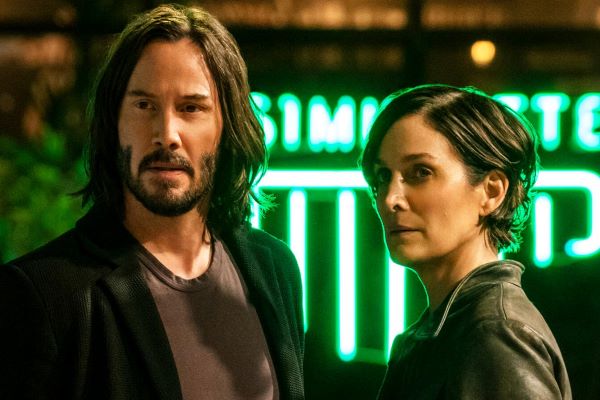These days, it seems like every time you turn around, a beloved film franchise has either been remade, rebooted or a legacy sequel has been released. It’s therefore hardly surprising that the seminal ’90s action sci-fi franchise, The Matrix, would have the same treatment, even considering that this was a franchise that had a fairly definitive ending. So, while the somewhat naff and overused “resurrection” title feels initially clunky, it’s also pretty apt. This is a zombie of a film, something that the movie itself clearly knows, and winds ironically into the meta-narrative as well as the literal text of the film.
The story picks up many years after the original canonical films, games and comics have ended. In modern day San Francisco, Thomas Anderson (Keanu Reeves) is now a wealthy and respected video game writer. His much-lauded work on The Matrix games is in his past, as are some serious mental health issues and brushes with attempted suicide. He’s also oddly obsessed with Tiffany (Carrie-Anne Moss) a middle-aged biker mom who drinks at the same coffee house he favours. Mr. Anderson has been keeping on the even keel with the help of his analyst (Neil Patrick Harris) and a prescription to some remarkably familiar blue pills. However his mental health starts to spin into decline when his firm’s parent company, Warner Brothers, strongarms him into working on the project, The Matrix 4. But of course, this is a Matrix film, so inevitably, hackers from the “real world” led by newcomer Bugs (Jessica Henwick) come to liberate him from his cyberspace bondage, so he in turn can free the world.
So far, so painfully on the nose and meta it almost feels like overt parody.
The strange thing about The Matrix Resurrections, is that it feels both like exactly the film that Lana Wachowski wanted to make, and also an utterly misguided sequel in almost every way. The first act of the film, revolving around Anderson, is easily the most compelling part of the experience. Reeves playing the increasingly befuddled and disenchanted writer, surrounded by a team of barking enthusiasts and producers, feels like the swipe at Hollywood executives it clearly is. There’s a clear sense that this is a film that no-one really wanted to make, but was going to happen regardless by studio mandate, and it’s both surprising and funny that the script literally features an exchange about this between Reeves and his boss, Jonathan Groff.
The problem is that once the film steps away from this, and back into familiar Matrix territory, it becomes quite plain that this is exactly the sort of original story-rehashing soft reboot that other franchises have been banking since Star Wars: The Force Awakens or Jurassic World. The only difference is that Resurrections goes the full hog and pilfers ideas from each of the Matrix movies in turn, making every act a return in part to one of the previous films. Added to that, the action which was always a signature draw in the older films is a step down cinematically. At times it’s incomprehensible to watch, having little of the beauty and simplicity of Woo-Ping Yuen‘s expert choreography, or Bill Pope‘s clean and easily understood cinematography.
That’s not to say that there’s nothing new or good here, and nothing of value. Moss and Reeves get more opportunity to flesh out their characters and add meat to their previously vague and underwritten romance, and there are some novel additions to the universe. Although the Train to Busan homage sequence, and the Zombie-like “swarms” of attacking bots, feel like a step down in fun from the gun-toting kung-fu Agents of old.
Ultimately, it’s a film that is passably entertaining, but really doesn’t need to exist, adds fairly little to the universe, and at times even feels like it was made contemptuously. And while it’s far from a bad time or a terrible experience, it’s also barely worth making the effort to see. Take the blue pill on this one, and keep snoozing.
In cinemas nationwide
